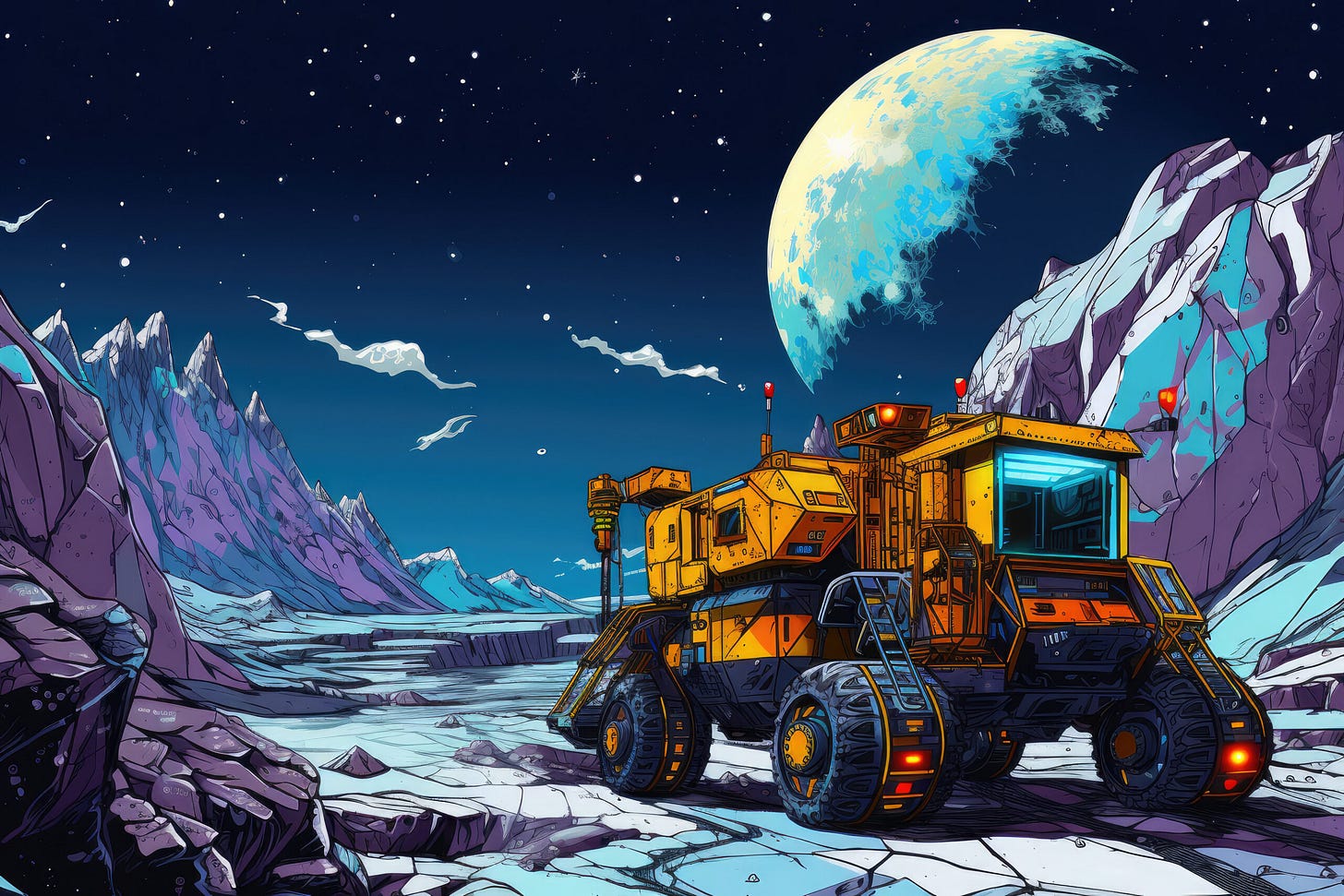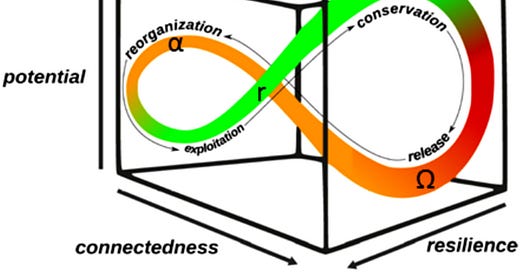Mind Expanding 17 Sep 2023: our time on the river🛶meet Mediocrates✍️AI and Leviathan🏛️ quantum monism⚛️the three-legged stool 3️⃣snake parasites in a brain🐍
Will technological accelerationism be constrained by ecological limits?
Mind Expanding is Memia’s ~fortnightly curation of links to deeper dives, bigger thinks and other eclectica that I’ve come across while compiling the weekly newsletter.
In today’s post:
⏳Interesting times it’s so over / we’re so back.
🧬Close call new genetic research reveals a population "bottleneck" of less than 1300 humans total 930,000 years ago.
🛶Our time on the River how we arrived at imminent biodiversity collapse.
📉The first stages of civilisation’s collapse…? History never repeats itself, but it does often rhyme?
📈…Or an unprecedented opportunity? Collapse isn’t the end…it’s only the beginning…
⛏️Never run out of resources accelerationists on future material abundance.
🤖💭AI cogitations Deeper perspectives on the continuing torrent of AI releases.
✍️Meet Mediocrates AI, meh.
🛠️LLM product patterns Patterns for building systems with large language models.
🏛️AI and Leviathan AI and its impact on liberal democracies.
🗳️Human-centric mechanism design AI for designing fair societies?
🇮🇳 India’s AI opportunity Microsoft report on AI governance in India, the world’s most populous nation.
🌐Global AI Governance…or not? Joanna Bryson is sceptical on global AI governance.
⚛️ Quantum monism: Is the whole Universe just one single (entangled) quantum object?
🛡️ Future proofing leadership: A recent interview with Cynefin founder Dave Snowden as he passed through Aotearoa.
📊 Data Lakes…warehouses…meshes what are they, exactly?
📝 Miscellany: And an assortment of other noteworthy links including:
📓 Exocortex do note-taking apps actually make you smarter?
🌐 Three-legged stool: a vision for a new digital public sphere
🚶 Car-free city: Pontevedra in Spain is has been banning cars for 24 yearas
🌞 Open ventilation building: climate-adaptive architecture
🐍 Snake Parasites in a brain: Yikes
📚 Reading and watching List
Memia’s regular crop of streaming and book recommendations
Thanks for reading, enjoy!
⏳Interesting times
A spectrum of perspectives interpreting our tumultuous times with various levels of pessimism through optimism. (The fundamental question arising from the last few months for me: will technological accelerationism be constrained by ecological limits?)
🧬Close call
New genetic analysis from a team at the Shanghai Institute of Nutrition and Health estimates that the population of ancestors of all today’s humans fell by 98 per cent to only 1280 “breeding individuals” around 930,000 years ago — and the population remained very low until around 815,000 years ago. (A phenomenon known as a population “bottleneck”). How history turns on a knife-edge…
🛶Our time on the River
Tom Murphy writing in Resilience: Our time on the river. How did we get to today’s imminent biodiversity collapse? (🎩 @samrag for sharing)

📉The first stages of civilisation’s collapse…?
Michael T Klare leverages off geographer-historian Jared Diamond’s bestselling 2005 book Collapse: How Societies Choose to Fail or Succeed to speculate that We Are Witnessing the First Stages of Civilisation’s Collapse:
“Will our own elites perform any better than the rulers of Chaco Canyon, the Mayan heartland, and Viking Greenland?…As Diamond argues, each of those civilizations arose in a period of relatively benign climate conditions, when temperatures were moderate and food and water supplies adequate. In each case, however, the climate shifted wrenchingly, bringing persistent drought or, in Greenland’s case, much colder temperatures. Although no contemporary written records remain to tell us how the ruling elites responded, the archaeological evidence suggests that they persisted in their traditional ways until disintegration became unavoidable.”
📈…or an unprecedented opportunity?
Conversely: Futurist Nafeez M Ahmed writes the Age of Transformation newsletter offering “systems-thinking for the global phase-shift”. He is way more optimistic about our current time… The Collapse of Civilisation is an Unprecedented Opportunity:
“Collapse is not the end - it's the beginning. The fear and uncertainty of this time signals the obsolescence of old ways of being. As we step into the unknown, truly new ways of being are emerging. Our challenge is to seize on and amplify these opportunities…
[there is] a wider body of evidence suggesting that the rise and fall of civilisations in history is part of a longer process of human cultural evolution. This research draws on the seminal work of the late ecologist Crawford Holling, who spent decades studying natural systems, from predator-prey dynamics to forests.
Holling found that all ecological systems experience a life cycle which goes through four stages: growth, conservation, release, and reorganisation. Holling called this the ‘adaptive cycle’…
Since then, scientists have found that the adaptive cycle is applicable to social systems and organisations, and can be used to understand processes of political change…Holling’s framework can be used powerfully to make sense of the huge social-ecological system that is human civilisation.”
⛏️Never run out of resources
For an even more optimistic (accelerationist) take on humanity’s future material abundance, Marian L. Tupy and David Deutsch partner on We Will Never Run Out of Resources:

“The supply of minerals is theoretically finite, but human knowledge and creativity are limitless.…the cost of energy is bound to fall. The sun is effectively a nuclear fusion reactor converting millions of tons of mass into energy every second. Someday soon we will be able to capture as much of that energy as we like via super-efficient solar panels. The difficulty won’t be harvesting that energy but getting rid of waste heat by radiating it into space. We may find it more convenient to make our own fusion reactors. All the elements found on Earth other than hydrogen and helium were made by transmutation in various kinds of stars. In the distant future, we could use artificial fusion not only for energy but for artificial transmutation, to make whatever elements we like. All we need is abundant energy and hydrogen, which is plentiful in the water that covers most of the Earth’s surface and is the most common element in the universe.
Long before humans have extracted all the useful atoms in the Earth’s crust and oceans, we will develop the technological sophistication to obtain vastly more atoms and energy from asteroids, planets and beyond. In that future, just as has always been the case, the only bottleneck will be the rate at which new knowledge can be created. And nothing prevents us from improving that rate too. Knowledge is the ultimate resource and there are no limits on creating it.”
All of which I have generally agreed wholeheartedly with until very recently… but the complexity and fragility of the biological ecosystems which sustain us has reared up as an existential issue which could cause a mass extinction event well before humanity+AI colonises the solar system... this is the dualist superposition of our time.
🤖💭AI cogitations
Some deeper takes on the AI torrent flowing around us…
✍️Meet Mediocrates
Russ White: Meet Mediocrates: when AI does all the heavy mental lifting
“Dear ChatGPT, Please Do All My Thinking for Me, Thanks!
Mediocrates decided reading books so he could learn to build solid arguments and elegant writing skills was far too much trouble. It is easier to let a chatbot do your writing for you. Reading an entire book or research paper was for chums. He decided too many books and papers were being published anyway, so he would let a chatbot summarize new books and papers.“
(The hole in this argument IMO: he uses the term “My thinking” to refer only to the unaugmented human mind - but “my” sense of identity is now well expanded to include the “holobiont” of Human body, brain PLUS AI augmentations. If “My thinking” includes my brain PLUS GPT, AI is only part of that…)
🛠️LLM product patterns
Eugene Yan scans patterns for building systems & products with LLMs. A useful framework:
Keep reading with a 7-day free trial
Subscribe to Memia to keep reading this post and get 7 days of free access to the full post archives.





